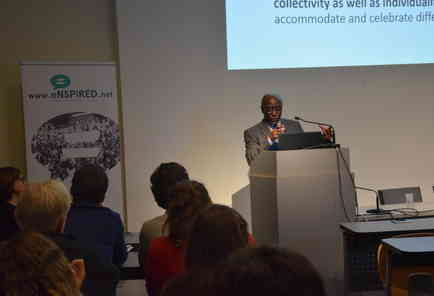From 16 to 20 April 2018, VVOB invites educational experts from Suriname and Zambia to share experiences on a shared challenge: how to ensure quality education for vulnerable children and youth.
Catalyst for development
Due to high poverty rates, Zambia has a long tradition of dealing with poverty in education. Parents, teachers and the community, with support from the government, put a lot of effort into ensuring learning opportunities for all children. They strongly believe in the power of education as a catalyst for development and in the important role of teachers.
Strong faith
In Suriname, the lower vocational schools (LBO) are often a last resort for youngsters that drop out of general education – a context similar to the Flemish one. LBO caters to a lot of vulnerable youth who deserve extra attention to maximise their chances of decent work. The faith of teachers in their abilities is very strong.
VVOB invites the following educational professionals:
- Esvah Chizambe, Assistant Director, Teacher Education and Specialized Services (TESS), Ministry of General Education
- Muyangali Muyangali, lecturer Mathematics for Early Childhood and Primary Education, Kitwe College of Education
- Mutinta Sifaya, Early Childhood teacher, demo school of the Mongu College of Education
- Georgina Sakala, Education Advisor, VVOB Zambia
- Corine Huyghe, Early Childhood Education Advisor, VVOB Zambia
- Anton Douglas, Trainer in prevention of behavioral problems and lecturer at the Surinam Pedagogical Institute for Teachers Primary Education
- Rachel Wittenberg, Developer and Trainer at Youth Empowerment Suriname
- Maggie Schmeitz, Technical Advisor iGrow, VVOB Suriname
Please join us for an international dialogue with these experts on 18 and/or 19 April!
Wednesday 18 April
Maximising educational opportunities for vulnerable children and youth: This is how you do it! Inspiring practices from Zambia and Suriname.
Programme
09:00 – 10:00 Welcome and reception with poster presentations and videos
10:00 – 12:00 Workshops, round 1
12:00 – 13:00 Lunch
12:30 – 13:30 Networking with poster presentations and videos
13:30 – 15:30 Workshops, round 2
16:00 – 16:45 Closing address by Lieve Blancquaert, renowned international photographer
Workshops (round 1 and 2)
- “Connectedness: The Ministry of Education in Zambia creates an enabling environment in the struggle against child poverty.” By Esvah Chizambe
- “Beyond the ordinary pedagogy: Focus on the development of love, care and belief in the early childhood teacher training in Zambia.” By Muyangali Muyangali
- “The Responsible Teacher: How Zambian teachers reach out to the homes of their learners.” By Mutinta Sifaya
- “Empowerment: Community schools in Zambia make the difference for disadvantaged children.” By Georgina Sakala
- “G-PAG: A trained teacher is worth 2.” By Anton Douglas
- “YES: Working towards Youth Empowerment in Surinam.” By Rachel Wittenberg
- “iGrow: Schools in Surinam don’t stand alone.” By Maggie Schmeitz
Thursday 19 April
Quality education for vulnerable children and youth: Focus on pupil and parent participation, dealing with diversity and TALULAR*.
(*teaching and learning using locally available resources)
Programme
09:30 – 10:00 Reception and welcome
10:00 – 12:00 Workshops, round 1
12:00 – 13:30 Lunch
12:30 – 13:30 Networking with poster presentations and videos
13:30 – 15:30 Workshops, round 2
15:30 – 16:00 Closing remarks by participants
Workshops, round 1
- Parental participation: Because its important!
- Dealing with diversity PART I: Pupil participation as a starting point for safe learning environments
Workshops, round 2
- The TALULAR Carousel: Teaching and learning using locally available materials
- Dealing with diversity PART II: A safe learning environment: Models, tips and exercises
Practical
- On Wednesday 18 april from 10 am to 4.45 pm and Thursday 19 April from 9.30 am to 4 pm
- In Brussels, Erasmus University College, Campus Bloemenhof, Zespenningenstraat 70, 2nd Floor
- For teacher educators, in-service trainers, (future) teachers and school leaders
- The workshops of the Zambian delegation are conducted in English. The workshops of the Surinam delegation are conducted in Dutch
- Participation is free of charge, but registration is obliged (see below)

